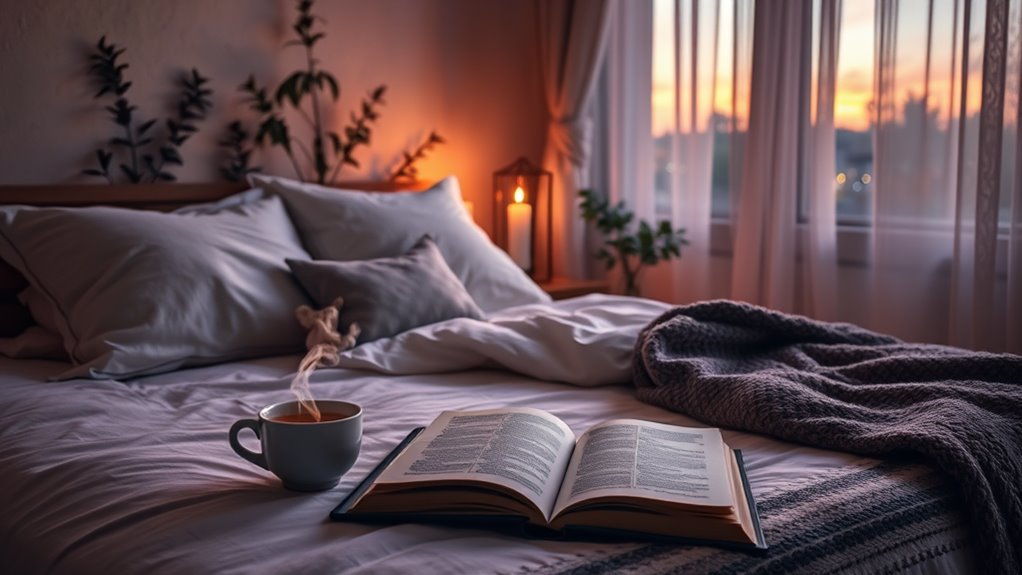How Evening Routines Can Help You Sleep Like a Baby!
Establishing a calming evening routine can greatly enhance your sleep quality. By keeping a consistent schedule, you align with your body’s natural rhythms, promoting better overall health. Create a tranquil environment by dimming lights and keeping your space cool and quiet to encourage deep rest. Limiting screen time before bed helps maintain melatonin levels, while calming activities like gentle stretching or mindful journaling can reduce anxiety. Tailoring your routine to include relaxing rituals guarantees you wind down effectively. As you embrace these practices, you might discover even more strategies to improve your sleep experience.
Key Takeaways
- Establishing a consistent bedtime routine signals the body that it’s time to wind down, enhancing sleep quality and promoting relaxation.
- Engaging in calming activities like reading or meditation before bed helps reduce anxiety and prepares the mind for restful sleep.
- Limiting screen time and blue light exposure at least 30 minutes prior to bedtime supports melatonin production and aligns with the body’s natural circadian rhythm.
- Creating a tranquil sleep environment with optimal room temperature, dim lighting, and noise reduction techniques facilitates deeper, uninterrupted sleep.
- Incorporating relaxation techniques such as deep breathing or gentle stretching promotes physical and mental calmness, enhancing the overall sleep experience.
Importance of Consistency
When it comes to getting a good night’s sleep, consistency is key. Establishing a regular sleep schedule can greatly improve your sleep quality and overall health. When you prioritize sleep consistency, you support your body’s natural circadian rhythm, which helps maintain a regular sleep-wake cycle. This, in turn, enhances your alertness and performance during the day.
Moreover, sticking to a consistent sleep routine reduces stress and boosts your emotional resilience. Regular sleep patterns are linked to better heart health and improved mental well-being, making it easier for you to handle challenges. Irregular sleep can lead to various health issues, including sleep disorders that affect your cognitive function and daily performance. Additionally, maintaining a consistent sleep schedule promotes long-term wellness, which is essential for your overall health.
To cultivate this consistency, consider setting bedtime reminders and wake-up alarms. Even on weekends, try to maintain the same sleep schedule to reinforce your body’s natural rhythm.
Developing a calming wind-down routine can also signal to your body that it’s time to sleep. By embracing these practices, you’ll not only improve your sleep hygiene but also foster a healthier, more resilient you.
Creating a Calming Environment
Creating a calming environment in your bedroom is essential for promoting better sleep.
By using dim lighting techniques, implementing noise reduction strategies, and maintaining an ideal room temperature, you can greatly enhance your sleep quality. A dark environment not only helps signal your body that it’s time to wind down but also promotes deeper, uninterrupted sleep.
These adjustments help signal your body that it’s time to wind down and prepare for rest.
Dim Lighting Techniques
Establishing a calming environment with dim lighting can greatly enhance your ability to wind down for the night. Dim lighting benefits your sleep by signaling to your brain that it’s time to relax. Exposure to bright lights, particularly blue light emitted from devices, can interfere with melatonin production and disrupt your circadian rhythm. This disruption can lead to metabolic issues, making it even more crucial to minimize light exposure in the evening.
By reducing this exposure in the evening, you help maintain your natural sleep cycle. Consider using red lights as blue light alternatives in your space. These emit a longer wavelength that’s less likely to disturb your sleep.
You can also use small, low-power lamps to create a soothing ambiance as bedtime approaches. Blocking out any external light with blackout curtains will further enhance this dim environment, making it easier for you to drift into a peaceful slumber.
Scheduling a “lights out” time can also help create a consistent bedtime routine. If you find yourself feeling sleepy, it’s a good cue to turn off the lights and head to bed.
With these strategies, you’ll cultivate a relaxing atmosphere that promotes restorative sleep, helping you wake up refreshed and ready for the day.
Noise Reduction Strategies
How Evening Routines Can Help You Sleep Like a Baby!
Noise Reduction Strategies (Creating a Calming Environment)
After setting the stage with dim lighting, addressing noise can greatly elevate your sleep environment. Reducing sound distractions not only helps you fall asleep faster but also guarantees you stay in a deeper sleep.
Here are some effective noise reduction strategies:
- Use thick, solid wood doors to block external sounds.
- Seal gaps under doors with weatherstripping to create noise barriers.
- Hang heavy, soundproof curtains**** to absorb outside noise.
- Install soundproof windows**** or insulate existing ones for added protection.
- Incorporate white noise machines**** to mask disruptive sounds.
By implementing these soundproofing techniques, you can create a calming environment that promotes better sleep quality. Quality of sleep is essential for mental and physical rejuvenation, which is hindered by nighttime noise.
Consider adding soft surfaces like rugs and cushioned furniture to absorb internal noise as well. Rearranging your room to minimize echoes can also help.
Don’t forget to experiment with white noise options, such as fans or nature sounds, to find what soothes you best.
Creating a tranquil space involves both minimizing external noise and absorbing internal sounds, allowing you to drift off into a peaceful slumber.
Prioritizing a noise-reduced sleep environment can transform your evenings and lead to healthier sleep patterns.
Optimal Room Temperature
A tranquil sleep environment hinges greatly on maintaining the right room temperature. Ideally, you should aim for a sleep temperature between 65-68°F (18.3-20°C) for the best rest. This range allows your body to cool naturally, promoting deeper sleep. Furthermore, maintaining a temperature within this range can help improve sleep quality, as higher core body temperatures are linked to decreased restorative sleep.
However, individual preferences can vary, so it’s important to listen to your own needs. During winter, consider adjusting the temperature to 16-18°C, while in summer, keeping it between 18-20°C can help guarantee comfort.
Remember, your body’s thermoregulation changes with the seasons, so seasonal adaptations are key to achieving restful nights. Rooms that are too hot lead to discomfort and restless sleep, while unduly cold conditions can also disrupt your rest.
Hence, maintaining a consistent and appropriate temperature is vital for your sleep quality. Don’t forget about ventilation and humidity levels, as these factors also play an important role in creating a calming environment.
The Role of Screen Time
Many people don’t realize how much screen time before bed can affect their sleep quality. The effects of screens, especially in the evening, can be detrimental to your ability to wind down and get restorative sleep.
Here are some key issues to take into account:
-
Blue light emission: Screens emit blue light that suppresses melatonin production.
-
Increased mind activation****: Engaging with screens can keep your mind overly stimulated.
-
Delayed bedtime: The allure of screens often leads to procrastination, cutting into precious sleep hours.
-
Altered circadian rhythm****: Exposure to screens can confuse your body’s internal clock.
-
Sleep disruption: Notifications and alerts can fragment your sleep throughout the night.
To combat these screen time effects, think about a digital detox by setting a screen-free buffer of at least an hour before bed. This allows your mind to relax and prepares your body for sleep.
Understanding the relationship between screen time and sleep is essential for improving sleep quality and duration. By limiting your evening screen use, you can help guarantee a more restful night and wake up feeling refreshed.
Establishing a Bedtime Ritual
Establishing a bedtime ritual is essential for creating a consistent sleep schedule that your body can rely on.
By incorporating calming pre-sleep activities, like reading or taking a warm bath, you signal to your mind that it’s time to unwind.
This not only enhances the quality of your sleep but also helps reduce anxiety, making it easier for you to drift off peacefully.
Consistent Sleep Schedule
Creating a consistent sleep schedule can greatly improve your overall well-being. When you prioritize sleep consistency, you tap into a range of health benefits that enhance both your physical and mental health.
Here are some key points to evaluate:
-
Reduces Mortality Risk: A stable sleep pattern lowers the chances of serious health issues.
-
Improves Sleep Quality****: Regular bedtimes lead to deeper, more restorative sleep.
-
Enhances Physical Health****: Consistent sleep supports a healthy weight and a strong immune system.
-
Boosts Mental Health: Regular sleep helps regulate mood and reduce anxiety.
-
Increases Productivity: Better sleep translates to sharper focus and improved daily performance.
To establish a consistent sleep schedule, set a fixed bedtime and wake-up time, even on weekends. Avoid stimulants like caffeine and alcohol before bed, and limit screen time to help your body wind down.
Creating a calming environment can also make a big difference. Remember, consistency is key; it strengthens your body’s internal clock and maximizes the health benefits of quality sleep.
Embrace this routine, and you’ll likely notice a positive shift in your well-being.
Calming Pre-Sleep Activities
In the quest for better sleep, incorporating calming pre-sleep activities into your nightly routine can make a significant difference. Engaging in mindful journaling is a powerful way to unwind. By reflecting on your day and jotting down worries or to-do lists, you can clear your mind and reduce anxiety, paving the way for restful sleep.
Consider adding gratitude journaling, which can foster a sense of calm and well-being.
Another effective practice is gentle stretching. This not only helps release physical tension but also encourages relaxation through mindful movement. Pair this with deep breathing exercises, like the 4-7-8 technique, to further engage your body’s natural relaxation response.
Additionally, a warm bath infused with lavender essential oil can be a soothing ritual. It promotes relaxation and mimics your body’s natural sleep-wake cycle.
To enhance this experience, play calming music or ambient sounds that can distract you from daily stresses.
Techniques for Relaxation
A variety of relaxation techniques can greatly enhance your evening routine, helping to pave the way for a restful night’s sleep. Incorporating these methods can help you unwind and reduce stress, making it easier to drift off:
-
Breathing exercises: Deep breathing can lower stress hormone levels by up to 28%.
-
Aromatherapy techniques: Using lavender oil promotes relaxation and improves sleep quality.
-
Yoga practices: Combining physical movement with deep breathing can create a calming effect.
-
Mindfulness meditation: This helps reduce symptoms of anxiety and depression, allowing for a clearer mind.
-
Muscle relaxation: Progressive muscle relaxation decreases tension and helps you feel more at ease.
You might also consider guided imagery or journaling benefits to process emotions and clear your mind.
A warm bath can relax your muscles, and massage therapy can further promote relaxation.
By incorporating these techniques into your evening, you’ll not only enhance your relaxation but also create a soothing environment that prepares you for a peaceful slumber.
Pre-Sleep Activities to Try
Taking a warm bath before bed can greatly help you wind down, as it mimics your body’s natural temperature drop that occurs during sleep.
Pairing this with calming music can further enhance relaxation, creating a soothing atmosphere that signals your mind it’s time to rest.
These simple pre-sleep activities can make a meaningful difference in your sleep quality.
Warm Bath Benefits
Soaking in a warm bath before bed can be a game-changer for your sleep quality. The soothing effect of warm water not only helps you unwind but also supports your body’s natural sleep processes.
Here are some benefits to take into account:
-
Improves sleep onset: A warm bath can help you fall asleep faster.
-
Regulates body temperature: Bathing raises your core temperature, which then drops, mimicking natural pre-sleep changes.
-
Enhances deep sleep: Warm baths can increase the proportion of deep sleep you experience.
-
Reduces muscle tension: Relaxing in warm water alleviates muscle stiffness and discomfort.
-
Supports mental calmness: A warm bath allows your mind to clear, making it easier to settle down.
For ideal results, aim for a bath temperature between 104 and 108.5 degrees Fahrenheit.
Soaking for about 30 minutes, ideally 1-2 hours before bedtime, can act as an effective relaxation technique that signals your brain it’s time to sleep.
Incorporating this into your evening routine could lead to more restful nights and energized mornings.
Calming Music Options
Finding tranquility in the evening can significantly enhance your ability to drift off to sleep, and calming music offers a perfect pathway to that serenity. Soothing playlists filled with instrumental selections can create an environment conducive to relaxation.
Genres like classical, with composers like Chopin and Debussy, provide gentle melodies that ebb and flow, helping your mind unwind.
Consider ambient music or chill-out genres, which feature slow tempos and soft beats to ease you into dreamland. These styles promote improved sleep quality by decreasing your heart rate and reducing stress hormones.
Aim to play calming music 30 minutes to an hour before bed, allowing your body to adjust to this pre-sleep routine.
It’s best to choose instrumental music without lyrics, as it won’t distract your thoughts. Keep the volume low to create a gentle background atmosphere that lulls you to sleep rather than keeping you awake.
Combining calming music with activities like reading or gentle stretching can further enhance relaxation.
Optimizing Your Sleep Environment
Creating an ideal sleep environment is essential for achieving restful nights and rejuvenating sleep. By enhancing your surroundings, including the use of sleep accessories and paying attention to sensory elements, you can considerably improve your sleep quality.
Here are some key factors to take into account:
-
Darken the Room: Use blackout curtains or eye masks to block light.
-
Regulate Temperature: Keep your room between 60 to 67 degrees Fahrenheit for optimal comfort.
-
Choose Comfortable Bedding: Select a mattress, sheets, and pillows that provide proper support and comfort.
-
Reduce Noise: Use earplugs or white noise machines to create a peaceful space.
-
Minimize Electronics: Turn off screens and other devices that produce distracting light and sound.
Managing Stimulant Intake
When it comes to getting a good night’s sleep, managing your intake of stimulants plays an essential role. Understanding how stimulant timing and dosage adjustment can impact your rest is vital. Stimulants can disrupt your sleep by fragmenting it or even causing insomnia if consumed too late in the day.
Here’s a simple guide to help you manage your stimulant intake:
| Stimulant Type | Recommended Timing |
|---|---|
| Caffeine | No later than 2 PM |
| Amphetamines | Morning, as prescribed |
| Methylphenidate | Early afternoon (if needed) |
| Sugary Foods | Limit in the evening |
| Non-stimulant options | Anytime, as needed |
Taking control of your stimulant consumption can lead to better sleep outcomes. Adjusting your dosage under medical guidance may alleviate sleep disturbances. If you’re struggling, consider consulting a healthcare professional who can assist you in finding the right balance. Remember, it’s not just about cutting out stimulants but managing them wisely to foster a more restful night.
Tailoring Your Evening Routine
Managing your stimulant intake is just one piece of the puzzle when it comes to achieving better sleep; your evening routine can greatly influence your rest as well.
Tailoring your routine to fit your personal preferences and lifestyle can help you unwind and prepare for a good night’s sleep. Here are some key elements to take into account:
- Establish a consistent bedtime routine.
- Limit screen time at least 30 minutes before bed.
- Engage in calming activities like reading or meditating.
- Create a sleep-friendly environment—cool, dark, and quiet.
- Incorporate relaxation exercises like deep breathing.
Flexibility is essential when creating your routine. Life can be unpredictable, so don’t hesitate to adjust your activities as needed.
Experiment with different calming techniques and see what resonates with you. Maybe a warm bath works wonders one night, while gentle yoga is better another.
Ultimately, the goal is to find a balance that allows you to signal to your body that it’s time to rest.
Benefits of Mindfulness Practices
As you wind down for the evening, incorporating mindfulness practices into your routine can greatly enhance your sleep quality. One of the most significant mindfulness benefits is its ability to reduce stress and anxiety. By lowering cortisol and adrenaline levels, mindfulness helps create a more relaxed state, paving the way for better sleep.
Meditation techniques like progressive muscle relaxation and deep breathing further promote this relaxation, preparing your body for rest.
Additionally, mindfulness practices can improve your overall sleep quality. Research indicates that mindfulness meditation can alleviate insomnia symptoms and reduce daytime sleepiness, allowing you to wake up feeling more refreshed. By fostering a calm mental environment, mindfulness encourages a sleep-friendly mindset.
Moreover, engaging in techniques such as body scan meditation or gratitude meditation can shift your focus from worries to positive thoughts, effectively decreasing ruminative thinking that often disrupts sleep.
These practices not only improve mood but also activate the relaxation response, countering the stress response. In short, integrating mindfulness into your evening routine equips you with the tools to enhance sleep quality and overall well-being.
Enhancing Sleep Hygiene
Integrating mindfulness practices into your evening routine sets the stage for enhancing sleep hygiene. By adopting consistent habits, you can create an environment that promotes restful sleep. Here are some strategies to ponder:
-
Set a consistent sleep schedule****: Go to bed and wake up at the same time daily, even on weekends.
-
Create a relaxing bedtime routine****: Engage in calming activities like reading or stretching.
-
Optimize your sleep environment: Keep your room dark, quiet, and cool for better rest.
-
Limit sleep disruptors: Avoid caffeine, alcohol, and heavy meals before bedtime.
-
Contemplate sleep supplements and herbal remedies****: Natural options like melatonin or chamomile can support your sleep efforts.
These practices help train your brain to associate certain activities with sleep, making it easier to unwind.
As you cultivate these habits, you’ll likely notice significant improvements in your sleep quality. Remember, consistency is key!
Adapting Routines Over Time
When it comes to sleep routines, flexibility is crucial as life stages and circumstances change. Your evening routine should evolve alongside your needs, whether you’re caring for an infant, guiding a growing child, or adapting to the demands of adulthood.
For infants, establishing consistent bedtime rituals like bathing and reading helps signal sleep time, but be ready to adjust these as their sleep patterns develop.
As children grow, their routines should remain engaging yet predictable. Involving them in the planning can make the process enjoyable, and focusing on just a few calming activities keeps things manageable.
For adults, it’s important to customize your routine to fit your lifestyle. Incorporating relaxing activities like meditation or warm baths can promote better sleep quality, but don’t forget to prioritize consistency—even on weekends.
Life changes, such as a new job or family responsibilities, may require further routine adjustments. Embrace this flexibility and utilize technology, like reminders, to help you stay on track.
Regularly re-evaluating your routine guarantees it continues to support your evolving habits and promotes restful sleep.
Frequently Asked Questions
How Long Does It Take to Establish a New Bedtime Routine?
It usually takes you about 2-4 weeks to establish a new bedtime routine. Routine consistency is essential, as it directly impacts your sleep duration and helps your body adjust to better sleep patterns effectively.
Can Naps During the Day Affect Nighttime Sleep Quality?
Yes, napping can affect nighttime sleep quality. While napping benefits include improved alertness and mood, timing is essential; late naps disrupt sleep cycles, leading to fragmentation. Aim for early, short naps to minimize nighttime disturbances.
What Are the Best Essential Oils for Promoting Sleep?
To promote sleep, you’ll find lavender benefits in calming your mind and chamomile tea soothing your body. Both can alleviate anxiety and enhance relaxation, creating a tranquil environment for a restful night’s sleep.
Is It Okay to Read on a Tablet Before Bed?
Reading on a tablet before bed isn’t ideal. The blue light affects your melatonin production, and increased screen time can disrupt your sleep quality. Consider alternatives like physical books or audiobooks for a more restful night.
How Can I Handle Sleep Disruptions From External Noise?
To handle sleep disruptions from external noise, consider using white noise machines or soundproofing solutions like curtains and acoustic panels. These methods can create a calming environment, helping you achieve more restful, uninterrupted sleep.
Conclusion
As the sun sets, painting the sky with hues of gold, your evening routine becomes the gentle lullaby that cradles you into restful sleep. Embrace consistency, cultivate a calming environment, and let go of screens, like leaves drifting from trees. Each ritual you weave is a thread in the tapestry of your well-being. By nurturing your mind and body, you’re not just preparing for sleep; you’re inviting serenity into your life, ensuring tomorrow’s dawn brings renewed energy and clarity.



